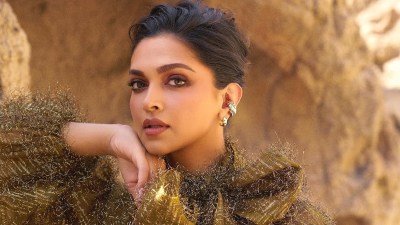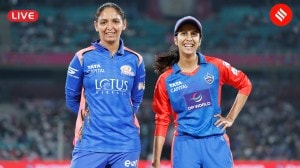Meet the Manx
Are they British? Are they English? No,they are from Isle of Man,a country for CWG.
Are they British? Are they English? No,they are from Isle of Man,a country for CWG.
The guard flips it clockwise,round and round for a while,but the symbol makes no sense to him. The card matches all requirements,but the flag is something hes never seen before. The guard then tries the anti-clockwise direction,but the three spurred legs separated by 120 degreesconjoined in the middle by a yellow underwearlook the same in the red background,from all possible directions. He calls his superior,an English-speaking police officer for help.
The officer repeats the process,scrutinising the length and breadth of the accreditation card. He reads the name of the country printed in block letters,but realises hes never heard of it before.
Which country are you from,sir? he asks brusquely,forcing the patiently waiting athlete to break his silence.
Isle of Man, Timothy Kneale says,pausing hopefully for recognition. Were from the British Isles, he adds after a while.
Doubts clarified in an instant,the policeman laughs aloud. Oh! Britain. Thats all you had to say, he blurts joyously,before asking the guard to allow the athlete to pass through the security check-in.
Sorry for the trouble sir. There has been a mistake; a logo has been printed instead of your flag.
Collecting his Commonwealth Games identity card back from the apologetic policeman,double-trap shooter Kneale smiles to himself sheepishly.
Draped by the Union Jack for every other important sporting event in the world the Olympics,Davis Cup or Tour de France,to name a few Isle of Man is dragged under the Great Britain umbrella,losing its name to the more powerful coalition.
Just like Scottish tennis player Andy Murray has been adopted by England as one of its own,Kneale is also used to being called something he isnt,English. While Murray suddenly becomes Scottish when he loses in the semi-finals of Wimbledon,Kneale isnt so blessed.
Even if I miss my clay pigeons,I am still called English. I participate as part of the Great Britain side in most shooting events. Our side is popularly known as Team England,and all my teammates English. Its a bit of a joke,but Im used to it now, Kneale says.
But once every four years,athletes from the land of Tynwald the oldest parliament in the world get to represent themselves. Being part of the Isle of Man contingent is their finest hour.
The Commonwealth Games is the pinnacle of our lives as sportsmen. We get to don our countrys name on our jerseys. The tournament gives us our identity back. We get to play against,and not with,our Great Britain teammates,adding a little spice to the event, the 27-year-old says.
Compatriot and compound archer Sarah Rigby agrees. Around the world,we may be known as Britons,but during the Commonwealth Games,we get to be ourselves. Were not British,English,Scottish or Welsh,the people we are mistaken for regularly,we are Manx the citizens of Isle of Man, she explains.
Their 34-athlete delegation,their largest yet in CWG,is out exploring the Village barely few hours after landing in Delhi and checking into their rooms. At the handicrafts complex,the athletes take in the sights and sounds of their home for the next fortnight. Rigby exclaims: India is so colourful. The Games Village itself has more variety than our entire country has to offer.
Locked in the middle of the Irish Sea,Isle of Man lies equidistant between Ireland and the south-western ridge of England. With a population of just 80,000,six degrees of separation is an alien concept. Over a surface area slightly smaller than the size of Mumbai,the inhabitants put on display a larger version of the American sitcom Cheers. If you are Manx,then everybody knows your name. We hardly come in contact with somebody we dont know. Even complete strangers are usually friends of friends. Everybody knows everybody in the country. Or everybody knows somebody who knows everybody, says Haresh Measuria,their India-born gymnastics team manager who migrated to Isle of Man at the age of seven. My hometown in India Bardoli,Surat has more people than this entire country, he says.
The most famous faces from the history of the countrys one-degree-of-separation loop have been the Bee Gees the Gibb brothers who made singing in falsetto a fad in the 70s. The second most popular personality from the countrys history is in Delhi for the Games.
Mark Cavendish is a national icon in Isle of Man,due to his victories at cyclings greatest event,the Tour de France. His compatriots are quick to remind anyone asking that his gold for Isle of Man at the Melbourne Commonwealth Games gave him his first splash in the cycling world.
Cavendish is our most famous sportsman. We havent had too many Olympians,Cavendish is one of them. The hilly landscape has made him a great cyclist,the gold at Melbourne made him a national treasure. What he did after that in France has made him a legend. Hopefully,hell be able to do our nation proud with a few medals here, archer Adrian Bruce says.
Praise for Isle of Mans pin-up boy continues to flow,this time from Steve Partington,the delegations assistant team manager. If you come to our country,somebody will invariably drive you past Cavendishs house in the capital,Douglas. He is someone we are proud of, says Partington,who works as a milkman at home.
But what happens to national interest when Cavendish represents Great Britain? Oh,thats all right too. He understands the meaning behind the three-legged logo on our flag. The symbol means wherever you throw it,it will stand. Throw us in any direction,and we will remain standing, he says.
They maybe overshadowed by the furls of the Union Jack,but despite the odds,the Isle of Man contingent is still standing. Much like the symbol on their unique flag.
- 01
- 02
- 03
- 04
- 05































